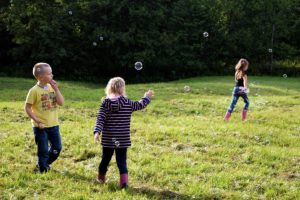Invite Just One Twin for a Playdate
 I had the pleasure of spending a few hours with a psychologist who specializes in teaching parents and children essential social skills. She mentioned that she has a number of twins who attend her groups, and I was intrigued to hear about how she helps identical twins learn to socialize with their peers.
I had the pleasure of spending a few hours with a psychologist who specializes in teaching parents and children essential social skills. She mentioned that she has a number of twins who attend her groups, and I was intrigued to hear about how she helps identical twins learn to socialize with their peers.
From the outside looking in, many people watch twins play effortlessly with one another and wish that their children were able to get along so well. While a twin connection certainly has many advantages, it may be a surprise to some to learn that it is not always easy for young twins to move away from their safe and predictable bond to make connections with other children.
The psychologist told me that she often has to articulate to twins that other children do not automatically comprehend what the twins are doing. Many identical twin pairs inherently and nonverbally enter into a play pattern or sequence without being aware that others around them have no idea what they are imagining or contemplating. I was delighted to hear that a professional in this capacity recognizes how much help some twin pairs need to learn how to accept others into their exclusive world.
If parents are unaware that this kind of exclusion can lead to unhealthy peer and social development as their twin children mature, they may exaggerate and idealize the notion of “twin synergy” rather than help the twins learn how to develop relationships with others. A number of twin pairs get around this issue by sharing a best friend. This third party usually has the capacity to get along with each twin and adjust to the ever-present twin dynamic.
I hope that parents of nontwins will feel comfortable inviting one twin over for a playdate and not feel compelled to invite both children. If, for example, twins are in separate classrooms and develop individual relationships with classmates, it is perfectly reasonable to only invite the twin who has made that connection.
Of course, it will be important to contact the twins’ parents to make sure that they feel comfortable with this situation. Hopefully, the parents can spend some special alone time with the twin who is not seeing a friend or make a separate playdate for them.
I have worked with many twins who suffer mightily with social issues into adolescence and young adulthood because they have not had experiences interacting with others as individuals. It is advantageous for twins to have opportunities to socialize independently so that they can both feel more socially confident and comfortable as they get older.
Photo in the public domain courtesy of Mimzy.

